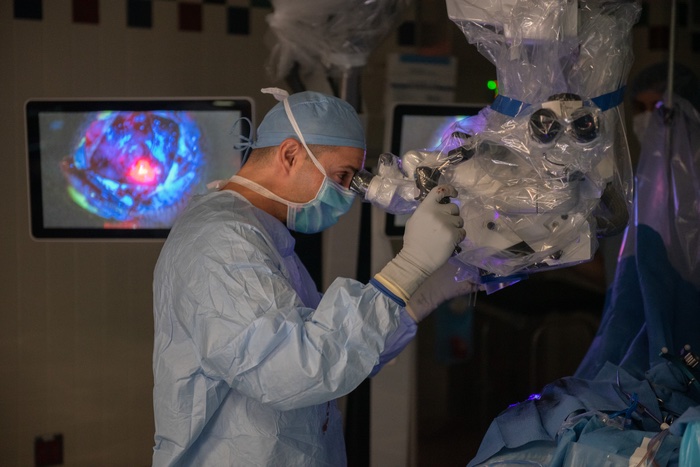One-Of-A-Kind Imaging Technology for Brain Tumor Surgery Improves Patient Outcomes
|
By HospiMedica International staff writers Posted on 16 Jan 2023 |

Glioma, a primary brain tumor, that begins in the glial cells surrounding and supporting nerve cells is the most common type of adult brain tumor. It comprises 78% of malignant brain tumors in adults and is also the most common pediatric solid tumor, accounting for about 53% of tumors in children younger than 14 years. Despite modern technology, surgeons find it difficult to determine if they have removed the entire brain tumor. Glioma treatment can be particularly challenging as the tumors usually have “finger-like” projections extending into various parts of the brain. Now, a one-of-a-kind optical imaging agent illuminates glioma, making it easier for neurosurgeons to see the tumor tissue to be removed. The enhanced visualization enables neurosurgeons to identify and remove as much of the cancer as possible, thus improving patient outcomes.
Gleolan from Medexus Pharmaceuticals (Mississauga, ON, USA) is the first and only FDA-approved optical imaging agent for use during fluorescence-guided surgery (FGS) in patients with high grade gliomas, which means the tumor is suspected World Health Organization Grades III or IV on preoperative imaging, as an adjunct for the visualization of malignant tissue during surgery. Gleolan is the only FDA-approved product that highlights a glioma tumor and surrounding cancer tissue in a bright hue.
Gleolan is an oral solution that contains aminolevulinic acid hydrochloride (ALA HCl) and is given to the patient to drink three hours (between two to four hours) before receiving anesthesia for the surgery. With the proper dosage of Gleolan administered during surgery, the neurosurgeon can view the brain through special blue light filters on a surgical microscope. Under the blue light, Gleolan helps the tumor “fluoresce” or glow a red-violet color. Since non-cancerous brain cells are unlikely to glow when using the blue light filters, the neurosurgeons can better distinguish the tumor from normal tissue, allowing them to remove more of the tumor tissue.
“When surgically resecting a brain tumor, our aim is always to remove it completely,” said Adam Robin, M.D., neurosurgeon at Henry Ford’s Hermelin Brain Tumor Center (HBTC), who performed the first brain surgery using Gleolan at Henry Ford West Bloomfield Hospital. “When using this imaging agent, we perform the tumor resection procedure under a special blue light, which causes the tumor cells to be bright pink or magenta in color. This visual aid enhances our ability to identify tumor cells that otherwise may have been hidden or more challenging to identify.”
Latest Surgical Techniques News
- Minimally Invasive Endoscopic Surgery Improves Severe Stroke Outcomes
- Novel Glue Prevents Complications After Breast Cancer Surgery
- Breakthrough Brain Implant Enables Safer and More Precise Drug Delivery
- Bioadhesive Sponge Stops Uncontrolled Internal Bleeding During Surgery
- Revolutionary Nano Bone Material to Accelerate Surgery and Healing
- Superior Orthopedic Implants Combat Infections and Quicken Healing After Surgery
- Laser-Based Technique Eliminates Pancreatic Tumors While Protecting Healthy Tissue
- Surgical Treatment of Severe Carotid Artery Stenosis Benefits Blood-Brain Barrier
- Revolutionary Reusable Duodenoscope Introduces 68-Minute Sterilization
- World's First Transcatheter Smart Implant Monitors and Treats Congestion in Heart Failure
- Hybrid Endoscope Marks Breakthrough in Surgical Visualization
- Robot-Assisted Bronchoscope Diagnoses Tiniest and Hardest to Reach Lung Tumors
- Diamond-Titanium Device Paves Way for Smart Implants that Warn of Disease Progression
- 3D Printable Bio-Active Glass Could Serve as Bone Replacement Material
- Spider-Inspired Magnetic Soft Robots to Perform Minimally Invasive GI Tract Procedures
- Micro Imaging Device Paired with Endoscope Spots Cancers at Earlier Stage
Channels
Critical Care
view channel
AI Heart Attack Risk Assessment Tool Outperforms Existing Methods
For decades, doctors have relied on standardized scoring systems to assess patients with the most common type of heart attack—non-ST-elevation acute coronary syndrome (NSTE-ACS). The GRACE score, used... Read more
'Universal' Kidney to Match Any Blood Type
Blood-type incompatibility has long been one of the greatest obstacles in organ transplantation, forcing thousands of patients—particularly those with type O blood—to wait years longer for compatible donors.... Read morePatient Care
view channel
Revolutionary Automatic IV-Line Flushing Device to Enhance Infusion Care
More than 80% of in-hospital patients receive intravenous (IV) therapy. Every dose of IV medicine delivered in a small volume (<250 mL) infusion bag should be followed by subsequent flushing to ensure... Read more
VR Training Tool Combats Contamination of Portable Medical Equipment
Healthcare-associated infections (HAIs) impact one in every 31 patients, cause nearly 100,000 deaths each year, and cost USD 28.4 billion in direct medical expenses. Notably, up to 75% of these infections... Read more
Portable Biosensor Platform to Reduce Hospital-Acquired Infections
Approximately 4 million patients in the European Union acquire healthcare-associated infections (HAIs) or nosocomial infections each year, with around 37,000 deaths directly resulting from these infections,... Read moreFirst-Of-Its-Kind Portable Germicidal Light Technology Disinfects High-Touch Clinical Surfaces in Seconds
Reducing healthcare-acquired infections (HAIs) remains a pressing issue within global healthcare systems. In the United States alone, 1.7 million patients contract HAIs annually, leading to approximately... Read moreHealth IT
view channel
Printable Molecule-Selective Nanoparticles Enable Mass Production of Wearable Biosensors
The future of medicine is likely to focus on the personalization of healthcare—understanding exactly what an individual requires and delivering the appropriate combination of nutrients, metabolites, and... Read moreBusiness
view channel
Philips and Masimo Partner to Advance Patient Monitoring Measurement Technologies
Royal Philips (Amsterdam, Netherlands) and Masimo (Irvine, California, USA) have renewed their multi-year strategic collaboration, combining Philips’ expertise in patient monitoring with Masimo’s noninvasive... Read more
B. Braun Acquires Digital Microsurgery Company True Digital Surgery
The high-end microsurgery market in neurosurgery, spine, and ENT is undergoing a significant transformation. Traditional analog microscopes are giving way to digital exoscopes, which provide improved visualization,... Read more
CMEF 2025 to Promote Holistic and High-Quality Development of Medical and Health Industry
The 92nd China International Medical Equipment Fair (CMEF 2025) Autumn Exhibition is scheduled to be held from September 26 to 29 at the China Import and Export Fair Complex (Canton Fair Complex) in Guangzhou.... Read more














